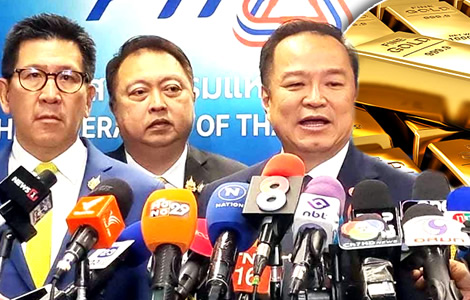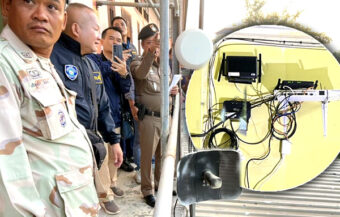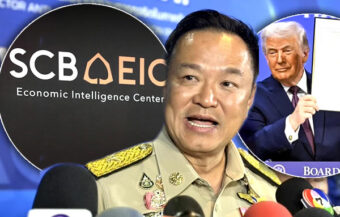PM Anutin vows urgent action as Thai baht surges 7% and gold exports to Cambodia spike sharply, pledging extended border closure, strict monitoring, taxation measures, and coordinated fiscal, monetary and regulatory steps to stabilise currency and protect industry.
Prime Minister Anutin Charnvirakul and incoming Finance Minister Ekniti Nitithanpraphat met business leaders on Monday, pledging swift action against the surging baht and soaring gold exports to Cambodia—two issues seen as closely linked. He made it clear that Thai-Cambodian checkpoints will remain closed under his interim government. Finance Minister Ekniti will continue direct talks with industry leaders, while the government moves aggressively to tackle economic challenges during its eight-month term, including the months after the 2026 General Election, until a new cabinet assumes office.

Prime Minister Anutin Charnvirakul on Monday declared urgent action to address Thailand’s strong baht, which has surged by 7% since the start of the year. Consequently, exporters and manufacturers are facing rising costs and reduced competitiveness in global markets. In addition, he ordered a full investigation into gold exports to Cambodia, which have escalated sharply over recent months.
Officials warned that smuggling networks may be exploiting gold to bypass international sanctions. Furthermore, the United States has targeted illicit trade flows in both Myanmar and Cambodia. Thailand’s government stressed that accountability and compliance will be strictly enforced.
During Monday’s meeting with the Federation of Thai Industries (FTI), Mr. Anutin emphasised listening to industry needs.
PM introduces finance minister and pledges action against the strong baht and cross-border trade issues
Of course, he introduced his incoming Finance Minister, Ekniti Nitithanpraphat, a top senior civil servant at the Ministry of Finance. The discussions highlighted the challenges businesses face from both a strong currency and cross-border trade restrictions.
The Prime Minister noted that border closures will remain until authorities ensure proper monitoring. He also confirmed that military and diplomatic tools may be deployed, but only after economic policies are in place. Meanwhile, incoming Deputy Prime Minister Ekniti will hold follow-up talks with the FTI later this week.
Thai police recently arrested a South Korean national suspected of laundering illicit funds through cryptocurrency and gold holdings. This case demonstrates the ongoing risk of high-value commodities being used for illegal financial transfers. Consequently, authorities are focusing on enhanced monitoring of gold shops and online transactions.
Assistant Governor of the Bank of Thailand, Pimphan Charoenkhwan, revealed that discussions with the Gold Traders Association are ongoing. As a result, operators have been asked to submit proposals to minimise speculative trading and protect the baht. Moreover, regulatory measures will be carefully reviewed to ensure both effectiveness and precision.
Thailand’s gold exports surge sharply, prompting new taxation and monitoring to manage the baht
Thailand’s gold exports rose 69% in the first seven months of 2025, reaching ฿254 billion. Notably, unusually high shipments to Cambodia prompted government scrutiny. At the same time, global gold prices have increased nearly 40% this year, further pressuring the domestic currency.
Bloomberg News reported that the Ministry of Finance and the Bank of Thailand are exploring new taxation measures on gold traded in baht. Nevertheless, gold purchased in US dollars, futures contracts, or through authorised shops may remain exempt. The goal is to reduce speculative outflows and control pressures on the baht.
Prime Minister Anutin stressed that investigations will proceed swiftly. If irregularities are discovered in gold exports, authorities will take immediate action. Furthermore, monetary and fiscal policies will be coordinated to stabilise the currency and maintain export competitiveness.
The Prime Minister also confirmed that his cabinet line-up will be submitted for royal approval later this week. In addition to Finance Minister Ekniti, key appointments include Auttapol Rerkpiboon as Energy Minister and Suphajee Suthumpun as Commerce Minister. These appointments are designed to strengthen economic governance and industrial oversight.
Strong baht triggers calls for action as Bank of Thailand cuts rates and monitors liquidity within the economy
Thailand’s baht traded at ฿31.74 per US dollar on Monday afternoon. It reached a four-year high of ฿31.57 last week. Consequently, rice traders and exporters are calling for urgent measures to prevent further appreciation. The FTI recommended a more sustainable exchange rate of ฿34–฿35 per dollar, which would support industrial competitiveness.
The Bank of Thailand last month cut its key interest rate to 1.50%, a near three-year low. Furthermore, analysts project additional cuts, potentially reaching 1% by the end of 2026. These moves aim to increase liquidity and counter currency appreciation while supporting growth.
Prime Minister Anutin highlighted the interconnected challenges of border management, gold exports, and currency stability. Therefore, coordinated measures between the Ministry of Finance, BOT, and industry are underway. For example, officials are tracking investor behaviour in gold markets to prevent speculative pressures on the baht.
Authorities emphasised that global gold trends and Thailand’s current account surplus are major factors in currency appreciation. Moreover, targeted measures will help limit large capital flows that distort market conditions. Meanwhile, gold shop operators are providing data on domestic transactions to improve enforcement.
PM stresses regional trade and ASEAN integration while preparing liquidity measures for stability
Mr. Anutin also stressed the importance of regional trade facilitation. In particular, ASEAN integration and industrial expansion were discussed as priorities for long-term economic growth. By improving supply chains and infrastructure, Thailand aims to strengthen its position as a regional industrial hub.
Military and diplomatic channels are being prepared to ensure compliance with border regulations. At the same time, economic measures will reduce illegal flows while supporting trade through formal channels. This dual approach reflects the government’s commitment to stability and security.
Some analysts suggest quantitative easing may be necessary to maintain liquidity. By printing additional baht, the government hopes to weaken the currency, support exporters, and stimulate domestic demand. However, officials are cautious of potential inflationary consequences.
Interim government faces pressure to act quickly while balancing growth and short-term interventions.
The interim administration has only four months before calling an election. Mr. Anutin was elected with the overwhelming support of the pro-democrat People’s Party. Significantly, he leads a more conservative and hawkish government than the outgoing Pheu Thai-led administration. Therefore, Mr. Anutin faces immense pressure to implement effective economic measures quickly. He must balance short-term interventions with policies supporting sustainable growth and industrial competitiveness.
Industry representatives at the FTI meeting on Monday stressed the importance of clarity on policy measures. Rice exporters, manufacturers, and traders called for actionable solutions to prevent the baht’s strength from harming profits. In response, the PM and his team outlined immediate monitoring programs and robust regulatory interventions.
Thailand’s economy is projected to grow between 1.8% and 2.3% in 2025, according to the state planning agency. Growth is expected to slow in the second half of the year due to US tariffs, weaker global demand, and high household debt. Last year, the country grew 2.5%, trailing its regional peers.
The Bank of Thailand’s interventions include close monitoring of liquidity and inflation indicators. Additionally, authorities are developing contingency plans to mitigate currency fluctuations from gold trading. These steps aim to maintain confidence in financial markets.
Quantitative easing and gold taxation policies reviewed to stabilise baht and boost industrial competitiveness
A key proposal promoted by the last government was quantitative easing. In short, printing more Thai baht. It is a proposal that may get the ear of incoming Bank of Thailand governor Vitai Ratanakorn, who takes up his role on October 1st. The plan would serve three purposes, including boosting liquidity in the system. It would, additionally, weaken the Thai baht and give rise to inflation.
Gold taxation policies are also under review to ensure speculative trading does not destabilise the baht. At the same time, security officials are coordinating enforcement across physical shops and online platforms. Moreover, investment and trading data are being analysed to identify suspicious patterns.
Prime Minister Anutin also outlined plans to enhance industrial competitiveness. Policies include expanding production zones, improving logistics, and promoting technology adoption. Furthermore, the government will encourage investment in high-value sectors to increase productivity and regional market share.
Cross-border trade remains a sensitive issue. Thailand is closely monitoring activity on the Cambodian and Myanmar borders to prevent illegal smuggling. As a result, officials are combining economic, regulatory, and security measures for effective oversight.
Gold shops submit strategies as the new government plans fiscal, monetary and regulatory measures
BOT officials have requested that gold shop operators develop proactive strategies to monitor sales. Consequently, operators are submitting proposals to mitigate baht volatility. These suggestions will be carefully assessed before implementation.
The Prime Minister’s approach is expected to combine fiscal measures, monetary easing and regulatory enforcement. For example, taxes on certain gold trades, stricter monitoring, and targeted liquidity injections are all being considered. Each measure is intended to stabilise the currency and protect exporters.
Economists emphasise that Thailand’s industrial and export sectors remain a top priority. By aligning economic policy more closely with business needs, officials aim to support sustainable growth. Furthermore, robust regulation and policing to counter illicit activity by criminal cartels are essential, particularly to ensure they do not compromise the kingdom’s economic objectives.
Certainly, the PM on Monday promised the interim government is acting decisively to tackle the baht’s strength. It would also regulate gold exports and strengthen industrial competitiveness. Coordinated efforts between the Ministry of Finance, Bank of Thailand, and industry associations are expected.
Kingdom faces economic strains with weaker exports, declining tourism and a financial liquidity crisis
Nevertheless, the kingdom faces a challenging situation. The Thai economy is presently struggling with constrained exports, reduced foreign tourist numbers, and a chronic lack of liquidity for ordinary people and businesses. Indeed, even larger firms are finding access to credit more difficult.
Top economist warns of a stronger baht as the US economy weakens. Tourism and exports face a severe hit
Printing money, allowing more liquidity and a cheaper baht may be the economic medicine Thailand needs
New boss at top Thai economic agency from October 1 at the same time as new Central Bank Governor
Pichai and Pheu Thai plan a seismic shift in Thailand’s economy, one that directly impacts foreign expat residents
Korean Goldfinger’s warm welcome by Technology and Crime Suppression police at Suvarnabhumi
They are also being impacted by the vagaries of the online fraud industry, with funds being seized from illicit sources. This week, a crisis within the banking system has opened up over new policing and tracking of online bank accounts.
A weaker baht and an easing of monetary policy, especially through quantitative easing, should be part of the solution. Meanwhile, the abuse of gold by powerful criminal syndicates is a new phenomenon that has just emerged.
Join the Thai News forum, follow Thai Examiner on Facebook here
Receive all our stories as they come out on Telegram here
Follow Thai Examiner here
Further reading:
Rate cut anticipated as outgoing Bank of Thailand governor attends last Monetary Policy Committee
Last minute tweaks in Bangkok as deal is finalised with U.S. However, Thailand may not match Vietnam


















